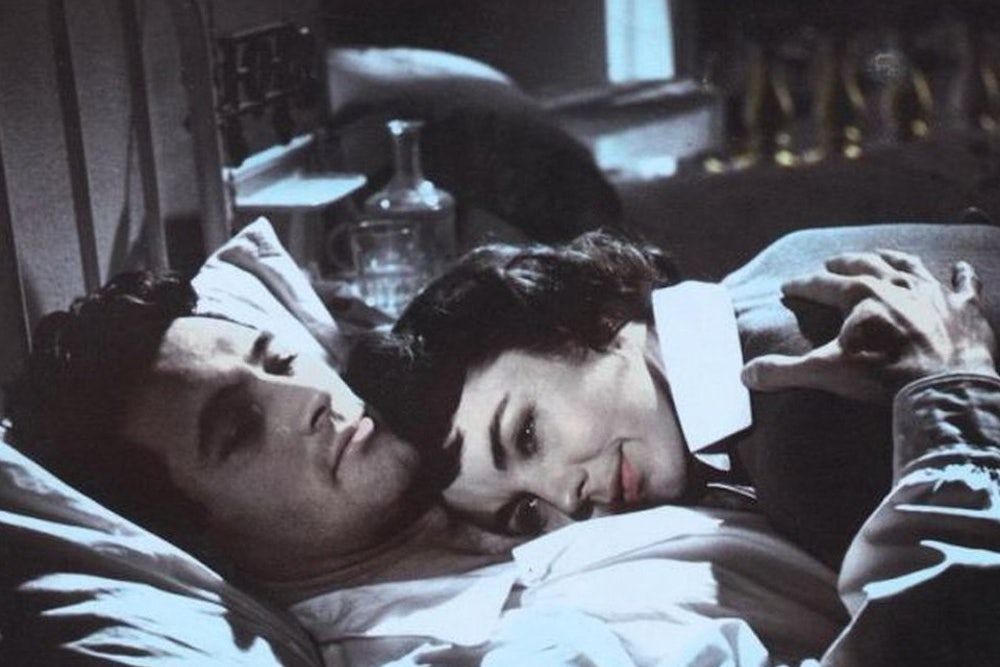The trouble with the new Selznick version of A Farewell to Arms which stars Rock Hudson as the ambulance driver, Frederick Henry, and Jennifer Jones as the nurse, Catherine Barkley, is that to be the least bit convincing or moving it demands that the viewer help along considerably by recollecting the novel—that he fill out the action, give emotional significance to the landscapes, add dimension to the characters. Otherwise it is a spiritless, silly, and, I fear, embarrassing movie. Only near the end, with the scenes in Switzerland and the final agonies of the hospital, does it even begin to echo the mood of the original story. Before the idyll in Switzerland there is merely a slender love affair, a few bloody battles, and worst of all, a hero who resembles some schoolboy halfback nervous about Saturday’s game.
Perhaps what is most irritating about the film is that too many times an exciting scene of Hemingway’s is shucked out in favor of a distressingly inferior one invented (if I may indulge the Muse a moment) by Ben Hecht, who is responsible for the script. Anyone who remembers Hemingway’s scenes of the Italian retreat from Caporetto—scenes which have always seemed to me almost written for the movies—will only squirm when he sees what has become of them. I don’t know whether the fault is Hecht’s or that of the director, Charles Vidor, but somewhere along the line the drama of Austrians, Germans, and Italians chasing other Italians gets lost and in its place we get a lot of pictorial messages about war—it is hell. Well, whoever said it wasn’t? What gives significance to Farewell is that this particular retreat is a particular kind of hell for a particular person. Naturalistic shots of barefoot tykes, pregnant women, squalling babies, call up pretty standard emotional reactions, and finally don’t tell us much about the hero; his disillusionment in the film with the world of arms comes to him with the swiftness of revelation and seems adolescent and unimportant.
I don’t think Mr. Hudson, however, has any kicks coming about the script; if it doesn’t help him, he plays tit for tat; he gives the impression he isn’t quite sure what he’s supposed to be doing, but that if he acts lovable, boyish, and polite Mr. Vidor will make everything come out all right. There is a constitutional clear-cuttedness about Mr. Hudson that he cannot hide—for good or bad—and consequently it takes a gargantuan suspension of disbelief to swallow that fact that his Frederick Henry has ever set foot in a whorehouse, gets pleasure from drink, and, if the occasion should arise, would kill someone. It is significant, I think, that one of Hemingway’s incidents left out of the film is at the Caporetto retreat where Henry shoots a sergeant who will not help to dig out the ambulance that is stuck in the mud.
There are, of course, some moments of life, in the film; for the most part they involve Vittoria de Sica, who plays Major Rinaldi, Henry’s Italian friend, and Jennifer Jones, who on one, perhaps two occasions, convinces you that there is a Catherine Barkley, a nervous, fearful, fanciful woman, and that she is living through the experience of her life. The high spots, however, are far too few, and their scarcity has led me to reflect upon whether it is the fault of Hollywood that the last two Hemingway films have failed so, or whether it is just that Hemingway is not for filming. In the novel, for instance, much of the power lies in Henry’s delight in the physicality of experience, a delight that is impossible, I think, for the camera to convey. Not that the movie camera cannot catch exactly colors, textures, the feel of things; rather, it cannot give you the feel of things from behind someone’s eyes.
Unfortunately, when the camera does try to show the relation between the physical world and the individual consciousness the result is a kind of heavy-handed symbolism. The rain, for instance, which Catherine repeatedly says she fears—well, it is one thing, at the end, for Catherine to be dying and Henry to mention that it’s raining outside, and it is quite another to see the rain, as one does in the film. The experience is too slender, too close to cliché almost, to bear up under the visualization.
This article originally ran in the February 17, 1958, issue of the magazine.
